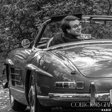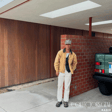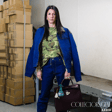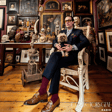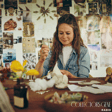The Role of Art in Creativity
00:00:00
Speaker
I think that there's really great art out there. There's artists making incredible things that deserve to see the light of day. And I believe that the more people we have in their flow state and in creativity, like the better that is for all of consciousness and just like humanity.
Exploring the 'Collector's Gene'
00:00:21
Speaker
What's going on, everybody? And welcome to Collector's Gene Radio.
00:00:25
Speaker
This is all about diving into the nuances of collecting and ultimately finding out whether or not our guests have what we like to call the collector's gene. If you have the time, please subscribe and leave a review. It truly helps.
00:00:39
Speaker
Thanks a bunch for listening and please enjoy today's guest Collector's Gene Radio.
Tappan: Challenging Traditional Art Spaces
00:00:46
Speaker
Today's guest saw something in the art world that many sensed, but few dared to challenge. Chelsea Nassib, founder of Tappan, is my guest today. And after graduating with a degree in painting, Chelsea stepped beyond the traditional gallery system to create Tappan, a platform designed to connect emerging artists with collectors around the world.
00:01:01
Speaker
What began as a bold experiment in accessibility became a movement, redefining who gets to buy art, who gets to sell it, and how we experience it. At its core, Tappan isn't just a marketplace. It's a living dialogue between artists, collectors, and the culture at large.
00:01:17
Speaker
Chelsea's vision has shaped a new generation of collectors and opened doors for artists whose voices might otherwise have gone unheard. In a world where the art market is often felt gated by price, by pedigree, by opaque tradition, Chelsea set out to reimagine the way collectors and artists connect.
Chelsea Nassib's Dual Perspective
00:01:34
Speaker
As both an artist and founder herself, Chelsea brings a rare dual perspective on collecting, on creativity, and the evolving role of the gallery in our culture. So without further ado, this is Chelsea Nassib for Collectors Dream Radio.
00:01:51
Speaker
Chelsea Nassib, founder of Tappan, welcome to Collectors Dream Radio. Hi, Cameron. So good to be here. Thanks for having me. It's my pleasure. So you founded Tappan shortly after leaving art school. And I would love to know if you remember the the first moment that you thought this should exist.
00:02:09
Speaker
You know, I mean, what was the gap in the art world? What still is the gap in the art world that you felt most urgently needed to be filled? So I had graduated art school and was selling my paintings, doing, you know, group shows with friends and felt like the path to success was pretty unclear from the artist's perspective.
00:02:32
Speaker
And then also from the collector perspective, if you weren't in the scene and didn't know where to go or didn't have a family, didn't come from a family of collectors, access to great work,
00:02:49
Speaker
felt slightly out of reach. And so i think from my perspective, there were a ton of incredible artists coming out of art school and people who wanted to collect but didn't have access.
Tappan's Evolution and Artist Support
00:03:03
Speaker
And this is in the time of like, This is two thousand and ten eleven so this is in the time of like Tumblr. It's pre-Instagram. I felt like connecting all of these incredible artists with people who wanted to collect was the win-win situation.
00:03:23
Speaker
I love it. And I've been following Tappan from very early stages and it's been so amazing to see the company rise and and all the great things and all the artists that have, have revolved in in and out of, you know, of the brand and the website and and your gallery.
00:03:39
Speaker
But, You know, you mentioned how you were a painter before you became a founder. And I think that that's a really important aspect of why you are where you are today. And I'd love to know from you what you think your background as an artist brings to the way that you curate and connect collectors with artists today, right? Because as great as Tappan is as ah as a brand and a company, and and you've built this amazing tool for everybody to use, do you think this would have been where it is today if you weren't a painter first? Yeah.
00:04:06
Speaker
Probably not. i think having the sensibility of an artist, first and foremost, just understanding artists at their core, what we're good at, what we're not good at, what we want to do, we don't want to do A lot of that shaped the model of how i formed Tappin. So just actual logistics.
00:04:28
Speaker
So we're built to support an artist's studio practice so that they can spend more time making and less time doing admin, operations, sales, and and all of that.
00:04:40
Speaker
um And then also from a curatorial perspective, all those years in critiques, I think have really shaped how I look and select the pieces and the artists that we choose to represent on the platform.
Curatorial Approach and Art Selection
00:05:01
Speaker
So really having an understanding of one, what is what does raw talent look like? I think that's always interesting and and important, but then how do you see the person, the artist's essence actually comes through in the work?
00:05:18
Speaker
When is it, really unique and worthy of like us highlighting. Yeah, that makes sense. I mean, being able to spot those emerging artists early on and and it's less of, you know, when you're starting a business or you have a business like Tappan, it's less about what just catches your eye, right? You have to find things that are you think are going to generally resonate with everybody, which is really hard to do with something like art because everybody's eye is different.
00:05:47
Speaker
And i think you've done such a great job at curating such amazing artists. We were chatting you know about this a little bit before we got on here, but Tappan began with just 20 artists.
00:05:59
Speaker
I would love to know what you were looking for in those first selections. Did you want it to be cohesive? Did you want it to be different? Were you just strictly looking for that raw talent? what What was going on in your head during that time?
00:06:10
Speaker
We were so young and and so we were looking for, yeah raw talent committed to their practice, like pursuing a full-time career in the arts, like all of, and then just like a really unique perspective. Like what were, what are artists doing that's so uniquely them that other people aren't exploring? I think in the really early days,
00:06:37
Speaker
we were reaching out to like friends and and friends of friends coming out of art school. It was really a moment where we were like, will people buy artwork online? Right. Because at the time the art world said they would never go online.
00:06:50
Speaker
And so we, you know really initially curious in a proof of concept, but yeah, I think, is it unique? Is it a reflection of the artist?
00:07:01
Speaker
I mean, i think you did that from the very beginning. I mean, you were able to embody this feeling of what Tappan was it all about and what is you know what it is all about to this day from the very beginning. And even though those artists and the platform has evolved a little bit, it's felt like a very cohesive graduation over time as to where you are today. Thank you.
00:07:23
Speaker
Oh yeah, of course. I mean, it's, I've been a fan for a long time, so it's, it's easy for me to say that, you know, but I think it's important for people who haven't discovered you yet or yeah There's actually a funny anecdote. When we first started, i was like so upset about the Sepio horse at Z gallery that was selling for a few thousand dollars.
00:07:43
Speaker
And so there, when we started bringing on photographers and one of them had a horse in one of their photographs, I was like, this is unique. This is her. This is interesting. You know, so just showing people what they could have relative to what, you know, their options were initially.
00:08:03
Speaker
Also, I think guided
Original Art vs. Mass Production
00:08:05
Speaker
some of that. So that's a flashback that just came. Well, let's talk about that for a second because, you know, there are a lot of these furniture stores, you know, the big box folks. We don't have to name all the names, but I mean, if you buy furniture, you know who these people are and they all sell art and it's really not cheap.
00:08:23
Speaker
No. a lot of the pieces are relatively expensive for what they are. And, you know, what what is your what is your gateway or pitch to someone other than saying, why would you not want an original piece? Why would you not want something from an emerging artist? Why would you buy from a retailer? What's like your initial pitch to someone who wouldn't necessarily understand that difference between buying something that they may really like that really resonates them but with them, but it's from a big box store and it's got no value? Yeah.
00:08:53
Speaker
Yeah. but um I think the uniqueness of an original work, that has to be motivating. Like the the works that are coming out of these big box retailers, they're mass produced, they have no value.
00:09:11
Speaker
And I think when you walk into Tappan's Gallery, for example, and you see a work and you connect with it, Then there's an artist's story that you get to hear.
00:09:23
Speaker
There's the actual brushstroke that you get to see. And then it's one of one. I mean, there's just so many layers of value in a unique work.
00:09:35
Speaker
Also, when you're coming in and you're, let's say, new to collecting and and making the jump from a big box to buying an original,
00:09:47
Speaker
maybe you fall in love with an artist. And so you get to get lost in their practice and and what they're interested in exploring. You can form, even if it's not a personal connection, like a human connection to the ideas that they're exploring in their work, whether it's iconography, like from dreams that are like super surrealist or meditating and, and you know, finding natural resources, making pigment in that process. Like those are all really interesting processes and stories behind the works that you can connect with.
Inclusivity in Art Purchasing
00:10:28
Speaker
I love how you changed the rules. You didn't change the way, you know, artists have to create their work or anything like that. You didn't ask them to go out of their way to do something totally different. You just changed the rules of how people can buy art and enjoy art. And so much of the traditional gallery world, if you will, feels very...
00:10:48
Speaker
opaque and elitist and intimidating. What did you want to unlearn or disrupt about that system when you started Tappan? I mean, has Tappan been well-received by gallerists or they intimidated by you or, you know, are they upset? Are they very happy that that you've brought them new and and emerging artists to this world?
00:11:09
Speaker
If they're mad, they haven't told me. ah So I don't know. but But the ones that that I have spoken to And the way that we've positioned Tappan has always been to be complimentary.
00:11:24
Speaker
We think of ourselves as like the beginning of a funnel. And a lot of our collectors will start collecting with us and then will continue collecting with us and get their feet under them and feel like they can go on and spend more at other galleries.
00:11:41
Speaker
And then I'll have galleries say to me, oh my gosh, I love what you're doing. i always send friends who can't afford something at our gallery or who are just starting to collect to come to you, things like this.
00:11:57
Speaker
So I think that is like such a nice vote of confidence in what we're doing in our program. In terms of changing the rules, Yeah, I mean, i just wanted to make it easy. i think that there's really great art out there. There's artists making incredible things that deserve to see the light of day.
00:12:20
Speaker
And I believe that the more people we have... in their flow state and in creativity, like the better that is for all of consciousness and just like humanity.
00:12:32
Speaker
So being able to support an artist's career and make it easy for people to discover new artists and then have there be transparency in the price and the availability which is like so unconventional and such a new rule, feels very, very simple from like a traditional e-commerce perspective, but definitely from the art world was a big, big deal at the time.
00:13:06
Speaker
I think it's so great how you make it feel so less transactional, right? Collecting can often feel very transactional and there's not always a lot of relationship that goes on when it comes to collecting anything.
00:13:19
Speaker
you know you You have to you know really buy the dealer, they always say, or you have to you know make these relationships. And you know it's it feels very seamless and very relaxed with tap. And how do you maintain relationship?
00:13:32
Speaker
feeling of intimacy and trust in in this increasingly ah difficult space of art, you know, the you know navigating all that. I think our art advisors on our team are really passionate about what they do and they really want to help you find whatever it is that you're looking for.
00:13:54
Speaker
And then on the website, if you're browsing We really, I mean, through socials, we're definitely putting the artist first and telling their whole story so that you feel connected to the piece.
00:14:09
Speaker
And then we try to keep that consistent throughout the website because you
Storytelling in Art Collecting
00:14:14
Speaker
aren't just buying an object that doesn't have a story. And so we want, you know, we want it to come through that this story that this was put together by somebody, that their signature is there.
00:14:27
Speaker
you know, I had an artist come fly her paintings in from Korea In her arms, she gave us her painting. She said, I'm dropping off my babies.
00:14:38
Speaker
I had to bring them to the U.S. myself, you know? And so these pieces these pieces really are special. and And, you know, I'm happy to hear that the way that we honor that comes through to the collector.
00:14:54
Speaker
Certainly, no, that's such a great story. and And that is part of the story that, you know, gets passed on to the collector who buys that piece, right? It's that that piece of work wasn't driven in the car or put in a shipping box and sent to you that was flown from Korea all the way to to you and delivered, you know, by hand by the artist so that it could get there safely. And, and you know, she could say goodbye, you know, one last time sort of thing.
00:15:20
Speaker
And I think that that's so special and no one's really telling those stories and so much about collecting is about storytelling. And when it comes to art, right, it's all about how you interpret it and everyone interprets a piece differently. You can't tell someone, well, this, you know, the artist can tell you what it's about and then the collector can say, well, this is how it makes me feel.
00:15:42
Speaker
And i I think that that story always gets lost in between. And one one of your core beliefs, if you will, is that and collecting art and following that artist's career should be something that everyone can enjoy.
00:15:54
Speaker
What do you think it takes for that initial buyer on Tappan to turn into a lifelong collector, right? Like how are you keeping them interested and and getting them really hooked on this world of collecting art?
00:16:09
Speaker
I think that to start, when you buy the piece and it arrives, you're generally surprised. you're delighted in that the work is better in person than it was online.
00:16:25
Speaker
So if you liked it online and you bought it when you, when it comes to you and you can actually see the impasto and, or see the thread that is so exciting.
00:16:37
Speaker
So I think that that is that surprise and delight that definitely has a moment. And then, I think that, again, like we've been saying, the connection with the artist's story, following how their work evolves because their works always do evolve, and feeling like you caught that early and you're curious to see where they're going or how their work progresses through their lives.
00:17:05
Speaker
For example, I find generally like an artist, like a female artist after she has a baby, her work becomes bolder. It becomes, it starts to have more color in it, for example.
00:17:19
Speaker
um and And following how artwork evolves relative to really relatable moments in people's lives is like, and don't know, it's very connecting.
00:17:38
Speaker
It makes you feel connected and a part of something and and being able to watch how a person evolves is and through their artwork, something that you could own.
00:17:49
Speaker
i think that's the special thing. Yeah, I mean, you've you've said that you know before and in various you know you know journal write-ups on you that watching that artist evolve is part of the joy of collecting and following that along.
00:18:02
Speaker
Can you share an example of an artist that was on Tappan whose journey has just especially moved or surprised yours? Just a great case study for what Tappan is all about. Yeah, so for example, Heather Day is an artist who I think we started working with early, early in Tappan's career. And she was part-time at the time when we started working with her. So she had her day job and and she was painting, but her paintings were really special and interesting and
00:18:37
Speaker
she continued to evolve. And now she's showing with Berggruen Gallery, she's showing internationally, and her work still has the colors and like the strokes of when we first started working with her.
00:18:55
Speaker
But she started cutting and sewing her paintings back together. And the way that she's approaching it, her colors have evolved in their vividness and complexity.
00:19:11
Speaker
And I think a lot of what you're seeing in her work is an evolution of how she's evolving as a person as well.
Celebrating Artist Growth and Style
00:19:22
Speaker
We have an artist that started with us also very early. his name is Johnny Cheatwood. He started with these abstract works.
00:19:32
Speaker
They've now evolved into these really interesting figures. but the faces are still abstract, but the renderings of the actual body and and the compositions of the pieces are really evolved, they've really evolved quite nicely.
00:19:50
Speaker
And so it's always it's always great to see like an artist maturing in their practice, becoming more confident in their visions for themselves and and their artwork.
00:20:02
Speaker
That's really quite nice. Yeah, I mean, several artists have gone on, you know, who started on Tappan and then will go show at major galleries like Marian Boski and the whole. And what's that push and pull like for you? Because obviously you want, you know, as these artists grow, you would love for them to stay on Tappan, but sometimes they.
00:20:20
Speaker
they, you know, make other decisions or they decide to, you know, what they would, you know, consider, you know, the next step maybe be in their career. And what's that like? Cause you want to keep that relationship. You want to say, you know, we found this artist first and and hold on to that.
00:20:35
Speaker
Yeah. I mean, I think that we see it as a win when an artist will go on to Mary Ambowski or, or the whole or something like that, because,
00:20:48
Speaker
That's great. It's great for the artist. It's great for our collectors. It's great that they started with us and and have evolved. And we don't do exactly what some of those galleries are doing or selling at those price points. So...
00:21:06
Speaker
It's really part of the ecosystem, I like to think of it. And we really see it as a win that we spotted them early and that you could have had it. And now it's 50x or whatever.
00:21:19
Speaker
That's our perspective on it. Are those case studies, you know, things that you're often sharing on, you know, Tappan's website or on social? We probably should more than we do. Yeah.
00:21:31
Speaker
I mean, why not? I mean, it's it's such a testament to to what you guys do and and your guys, you know, the team's eye
Instinct and Diversity in Artist Selection
00:21:37
Speaker
and taste. And, you know, speaking on that, what does it take for Tappin to introduce a new artist to the platform? You know, what is the thought process of, you know, hey, here's this list of people that we want on here. These are the ones that really make sense.
00:21:51
Speaker
Is it the same way that you would choose to collect art, right? Is it based on instinct? Is it based on what you think your collectors are going to like? Yeah, I think that there's so much that goes into it. And we've we've kind of dialed in a lot, too, on specifics. But I think first and foremost...
00:22:11
Speaker
instinct, like, is it good? That's the first and foremost filter for so much of what we're looking through. And then we're looking to have a range.
00:22:24
Speaker
Not everything is for me in particular, but it is super unique and super good at that particular style.
00:22:35
Speaker
um so we try to definitely have a range and that's a range in mediums. It's a range in terms of like diversity and and the different parts of the world we can represent.
00:22:47
Speaker
so yeah, I think that there's a lot that goes into it, but I think that the most important is, is it good and is it unique and a really special representation of that person's essence and that person's uniqueness?
00:23:03
Speaker
Yeah. When you're thinking of bringing a new artist on on board, is it important for you to go see the work in person first before making that decision? Do they send you the work? How does that usually play out? Yeah, I wish I could go all over and to all the studios.
00:23:18
Speaker
um But no, no, unfortunately, we have to make calls over the computer. We're doing like studio visits online. And I mean, we get everything before it goes online. So, you know, if there's anything major, but for the most part, I'm not able to go to all the studios in advance.
00:23:41
Speaker
I mean, a lot of times, right, when collecting anything, you know, there's trends. How do you how does Tappan deal with trends? Do you try and stay away from them? Do you try and spot them early? Do you not even want to deal with trends and just solely stick to the ethos of buying what you guys think is great art or interesting art?
00:23:59
Speaker
You know, trend has to come in somewhere to a business when you're trying to, you know, get collectors on board. In general, we're not trend focused. And I think that there are a lot of, like, let's say political driven narratives or, you know, galleries who will want to back a certain type of artist.
00:24:25
Speaker
And I like to think of it less as like, because it's trendy, but because it's relevant to that moment, which is important because they're, you know, they're commenting on like a ah cultural moment.
00:24:40
Speaker
But in general, we stay more focused on longevity and something a little bit more timeless.
Physical Gallery Experience in LA
00:24:51
Speaker
In 2023, you opened Tappan's first physical gallery in Los Angeles. And what was that like bringing your digitally native brand into the physical realm? And do you think it's changed the experience for your collectors? Are they visiting often? Do they want to see the new works in person?
00:25:07
Speaker
It made a big difference for us. It was so important for us to meet our community and it was so nice to do it in the gallery space. I think going offline also helped people understand the caliber, the quality and the scale at which we were working, which was I think harder to register just through the online experience.
00:25:35
Speaker
People love coming in they love seeing the work in person, probably more than I had anticipated. Do collectors ever want to, you know, engage in this, you know, era that we're seeing of this like pay over time sort of thing? You know, we're seeing ah it a little bit in various sectors of of all, you know, alternative asset collecting where you can pay over time because, you know, even though Tappan is maybe selling artwork that's on the more affordable realm in terms of collecting art, right?
00:26:07
Speaker
Right. Yeah. it's still unaccessible to some other people. And, you know, is there ever this conversation of, do we let people pay over time? Yeah, actually we tried it. I mean, when we say we're committed to making it easy, we are committed. So if there's something that's going to make it easier for someone, who are we to say that it's not something that we're going to do?
00:26:30
Speaker
So we tried those payment term things, the plugins, and But it's not our customer. So it's it's not it's not something that we saw an increase in conversions with or anything like that. so Right. So why offer it at that point?
00:26:47
Speaker
Yeah. I want to talk about, again, you know the you know art as as just this general topic of collecting. and And we talked about it earlier, and it's so deeply subjective. For some, it's all about pure aesthetics.
00:27:01
Speaker
For others, it's all about context and meaning. And then somewhere in the middle, the two converge. And unlike most alternative assets, right art tends to strike you instantly or it doesn't.
00:27:13
Speaker
It either speaks to you right away or it really doesn't resonate with you. and You know, it's not like the work itself is going to change. The space that you imagine it living in isn't going to change.
00:27:24
Speaker
Do you think that there's value in the aesthetic-driven collector stepping back to consider context and conversely, the context-driven collector taking a pause to make sure the piece resonates on a purely visual level, right? Like, is there value for that aesthetic-driven collector who, the person who is constantly saying, I just care if it looks good?
00:27:44
Speaker
Yeah. Right. Is there value for them to take a step back and consider the context? Because even though it looks good, you know, maybe if they understood the context a little bit more, it may not appeal to them as much. And conversely, right, if the context driven collector took a pause to make sure that the piece really resonated with them on a pure visual level and less emotional, right, is is there value for those different types of collectors to see things from those different perspectives? Yeah.
00:28:12
Speaker
For sure. I mean, from my perspective, absolutely. I think that for the context-driven collector, you want to enjoy the things that you're living with. So ideally, it lights you up when you look at it. Ideally, you look at it not just purely on context and everything behind it, but what it does for you as you interact with it.
00:28:36
Speaker
And then I think for the aesthetic person, there can be so much more and so much deeper of a connection with an artwork that say you just love the way it looks and then you find out the story behind it.
00:28:53
Speaker
and And that like deep appreciation for the artwork, I think becomes tenfold.
Genuine Connections in Art Collecting
00:28:59
Speaker
Once you connect with the depths of of the meanings or or you know what the artist is exploring at the time.
00:29:07
Speaker
So absolutely, I think both ways. Are the artists that you feature on Tappan pretty accessible for the collectors if the collector wanted to ask them a question or understand something a little bit more? do you find that the artists are usually pretty open to conversing?
00:29:22
Speaker
Yeah, I find them really engaging. I find them really appreciative of people who are interested in learning more about their artwork. They're so grateful for the engagement.
00:29:35
Speaker
And, you know, also an artist's journey, it can be quite lonely. You're alone in your studio, just pouring your soul out. And then, you know, if you get to meet the person that connects with it, that's such an incredible bond that you could have. And so, yeah, I find most of our artists very willing.
00:29:57
Speaker
Do you think that that's something that gets lost in, you know, the gallerist space that once some of these artists graduate, for lack of a better term, to these big galleries,
00:30:07
Speaker
um and they're they're just represented there. Does that kind of connection become lost often? You know, it's it's a little bit more about the transaction. If you want it, you want it. You can have it if you can pay for it sort of thing.
00:30:20
Speaker
I hope not. i um I believe that most people that go into the arts, artists and gallerists, go in for the love of the art to support the artists.
00:30:32
Speaker
And so maybe as a matter of time constraint or energy constraint, you know, like an artist might say no later in their career. But I think for the most part, people who are in the arts are really doing it because they love it and and they would ideally want to foster those connections.
00:30:55
Speaker
Have you seen a shift in what today's collectors are looking for compared to when you first started Tappan? Is there a new generation of collectors with different values and tastes? I mean, is it always evolving? but What does that look like as Tappan's kind of, you know, ran through the years here?
00:31:11
Speaker
Yeah, I mean, I think it's very, it's a very interesting time for the art world. um It's been a slow two years for Tappan in particular, but the art world at large.
00:31:25
Speaker
And I think that you're seeing a graduation of The traditional collectors who are multi-generational and you're seeing this kind of newer generation of collectors come in I think that they do want a certain level of ease.
00:31:42
Speaker
I don't think that they're as interested in the elbow rubbing of the past So it'll be very interesting to see how it evolves, who sustains, and how it gets reshaped.
00:31:59
Speaker
There's a lot of conversation right now that it needs reshaping and reimagining, but it'll it'll be interesting to see how the collector drives drives that, because ultimately all the galleries are are there to serve the artists, but you know really the collectors. Yeah.
00:32:17
Speaker
The idea of a personal collection feels so powerful and intimate when you collect anything, especially art, because again, it's so subjective and it really always tells a story about what you're into and what speaks to you.
Personal Journeys Reflected in Collections
00:32:31
Speaker
What do you think defines a great collection? Is it the quality of individual works? Is it the variation in the work? Is it the story they all tell together? Is it just the fact that you know the collector bought what they liked? what What do you think really defines a great collection?
00:32:49
Speaker
For me personally, a great collection is bought over time, like a long time. And you've really gone out and bought what you love all along the way.
00:33:06
Speaker
For me, like the least impressive, most boring collection is you know all heavy hitters, all name brand.
00:33:16
Speaker
Blue chip. Right. That for me is like, okay, cool. You have the money to spend. Right. you know um For me, it's really cool when you bought it because it was a friend of a friend or you saw it and you fell in love with it. And then it became something really important years later, but you bought it because you loved it.
00:33:40
Speaker
that form of buying. i think also when you do it that way, the the actual collection is much more interesting. When people are nervous to buy a piece because they're like, oh you know, it's an investment or am I going to like it in 10 years or something to that effect?
00:34:00
Speaker
I like to tell them that it's like a good collection and and collecting in general is like ah time capsule and the different pieces that you buy over the course of your life are like are like souvenirs from that time in your in your life.
00:34:19
Speaker
So they represent where you were in that time. And you can look back and and see how you've evolved. and And then if you are buying what you like consistently across all things,
00:34:34
Speaker
ceramics or paintings or whatever it is, you will see consistency. And that's what makes somebody interesting, right? Is that through line.
00:34:46
Speaker
I love it. Chelsea, let's wrap it up with the collector's gene rundown. You know the drill. You can answer these based on the things that you collect. You could base it off the things that you know you've seen and worked on with Tappan and the collectors that you've dealt with.
00:34:59
Speaker
Totally up to your interpretation. Have fun with it. First one is, what's the one that got away? This could be a personal piece of art. This could be ah not art-related. This could be an artist you wish you worked with.
00:35:11
Speaker
You know, we had an artist, Sanaa Gataneha, and we were showing his work a couple of years ago. He's now with Karma Gallery, Um, and I did not get one when he was with us and now they're, you know, ah little bit outside the budget. So that would have been, that would have been a good one.
00:35:31
Speaker
Well, maybe there's a, a finder's fee, uh, exchange between the two of you. yeah Never, never be afraid to have that conversation.
00:35:43
Speaker
How about the on deck circle? So what's next for you in collecting? Maybe something that you've been hunting after. We're renovating our home. So I've been doing a lot of stuff for just like homemaking. where ah My husband and I are big entertainers. We like to have people over all the time. So tablescaping is a part of that and stuff for the kitchen, stuff for the table, that that kind of stuff is this top of mind.
00:36:12
Speaker
how about the unobtainable? So this is one that's just too expensive in a museum, private collection, just complete unobtainium. Okay, how about if my dining room was or had like Monet's lilies?
00:36:29
Speaker
Like it was like ah it was an oval dining room, just like the museum. That would be my dining room. That'd pretty insane. Yeah.
00:36:42
Speaker
The page one rewrite. So if money was no object and you didn't collect art or any of the other stuff, what would it be? Ooh, maybe vintage cars. There we go. Where would you go? Porsche, Mercedes? What are you thinking?
00:36:56
Speaker
Yeah, like Porsche and like the Jaguars, you know, like. Yeah. Incredible. Yeah. Yeah. Still, still art just in a different way. Exactly. Exactly.
00:37:10
Speaker
How about the goat? Who do you look up to in the collecting world or who do you think is a great collector? Alice Walton. She built Crystal Bridges. She buys what she loves. She supports like American artists.
00:37:23
Speaker
She's super generous. She's probably goat in my mind. The hunt or the ownership? Which one do you enjoy more?
00:37:34
Speaker
The hunt for sure. But my hunt involves like finding new artists, but still the hunt. Yeah, that's a bunch of fun. Yeah.
Skill of Art Collecting Over Time
00:37:43
Speaker
And most importantly, do you feel that you were born with the collectors, Jean?
00:37:46
Speaker
No, I think it's like something that you put time and energy into. And then in general, I feel like more of an editor, more of like curating, less of a collector. I actually don't love to have a ton of things, just really, really special ones.
00:38:06
Speaker
There you have it. Chelsea, thank you so much for coming on Collectors Gene Radio. Such a fan of yours and everything you've built at Tappan. And, you know, it's it's amazing to see how the platform and and your business evolves and in a space that is so deeply um loved and collected by so many people. So thank you again.
00:38:24
Speaker
Thank you, Cameron. was such a pleasure.
00:38:29
Speaker
All right. That does it for this episode. Thank you all for listening to Collectors Gene Radio.





